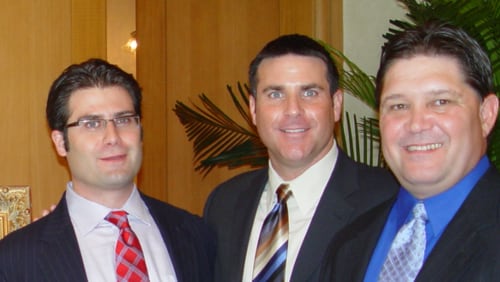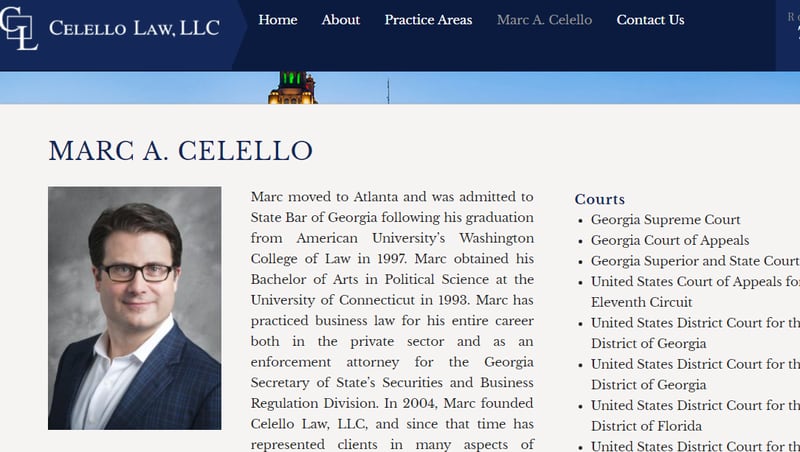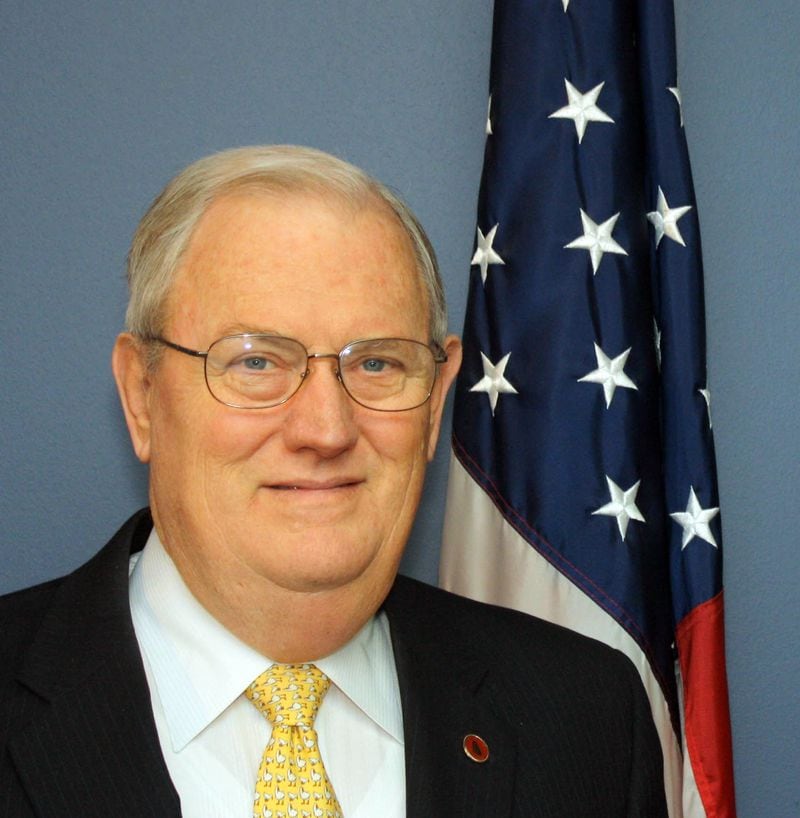Federal regulators say attorney Marc Celello did more than just whisper advice in the ear of a Cherokee County businessman accused of running a massive Ponzi scheme.
The general counsel for Jim Torchia's Credit Nation empire was also an "active participant" in fleecing elderly and unsophisticated investors out of their savings, preparing false documents and approving dubious advertisements that portrayed a sinking company as rock solid, the U.S. Securities and Exchange Commission alleges in a civil complaint filed Thursday. Celello is accused of fraud, aiding and abetting and routing investors' money into his own pocket.
Credit: Johnny Edwards
Credit: Johnny Edwards
"Lawyers are gatekeepers in the securities offering process, but that role cannot insulate them from responsibility for their own misconduct," Walter Jospin, director of the SEC's Atlanta office, said in a prepared statement. "When lawyers abuse their role and participate in securities fraud, as we allege Celello did, they can expect to see us in court."
Celello, a Roswell-based attorney specializing in corporate transactions and regulatory compliance, did not return messages from the AJC on Thursday.
Once a state enforcement attorney charged with rooting out securities fraud, in 2004 Celello decided to switch sides.
He left the Georgia Secretary of State's Office and went to work as personal adviser to Jim Torchia, a pugnacious former insurance agent whom he'd been investigating over allegations of selling policies without a license and misleading investors. A former Insurance Commissioner's investigator told the AJC that Celello's defection devastated the state's case against Torchia. Celello would help him sue or counter-sue anyone who crossed him in what became years of incessant litigation.
"He could block and stop and cause us all kind of grief," the retired investigator, Doug Gaddis, said of Torchia.
Business exploded. Torchia became a millionaire in life settlements and viaticals – the niche business of buying life insurance policies from the elderly and terminally ill, then cashing in when they die. Other states went after him, but Georgia mostly backed off. An AJC investigation found that Georgia Insurance Commissioner Ralph Hudgens was repeatedly told that Torchia was operating without a license but didn't act to stop him.
Flash forward to 2017, and a more formidable government agency has taken Credit Nation down. The SEC labeled it a multi-million dollar, multi-state Ponzi scheme, targeting naive investors through ads aired during the Rush Limbaugh radio show. Last year a federal judge effectively dismantled Torchia's network of investment companies, subprime auto loan businesses and limited liability companies, and a court-appointed receiver is currently trying to return some $10 million to dozens of investors who lost an estimated $61 million.
Credit: Johnny Edwards
Credit: Johnny Edwards
Now Celello, 45, has a bull's-eye on him, too. The SEC suit seeks unspecified civil penalties, a permanent injunction and a judge's order requiring Celello to fully account for his alleged misuse of funds and to forfeit any ill-gotten gains with interest.
As Credit Nation dealt in death, apparently the people whose policies it purchased weren't dying fast enough to pay investors. Its radio and newspaper ads told the public that investments were "100 percent asset backed" and "backed by hard assets dollar for dollar," but the companies were actually losing millions, paying out promised investor returns using new investor money, the feds alleged.
The latest complaint says Celello prepared or approved those ads, and he also once instructed a subordinate to "fabricate a 'rough balance sheet'," which was distributed to marketing representatives to use in their sales pitches.
"At least one marketing representative used the false information when soliciting investors," the complaint alleges. "That marketing representative stated that he would not have sold Credit Nation investments had he known that there was insufficient death benefit to support Credit Nation's outstanding liabilities."
The SEC alleges that Celello also oversaw dizzying transfers of funds from account to account that misdirected investor funds. Some money got routed to casinos. In one case, the SEC says, $470,000 in proceeds from a sale of auto loans to a third party went to Celello.
"Celello also knew that the revenue generated by Credit Nation was primarily composed of investor funds and that his fees were being paid out of investor funds," the complaint says. "In short, it appears that Celello worked with Torchia to move funds to wherever they were needed to keep the fraudulent scheme afloat using bank accounts over which Celello and Torchia exercised control."
Torchia has maintained that no investors ever lost money while he controlled the companies, and that the federal government just didn't understand the business like he did.
But the judge's injunction last year sided with the feds, saying Torchia was operating two investment schemes: In one, Credit Nation sold fractional interests in life insurance policies. The other scheme involved promissory notes that were said to be 100 percent asset backed and promised 9 percent annual returns.
About the Author









